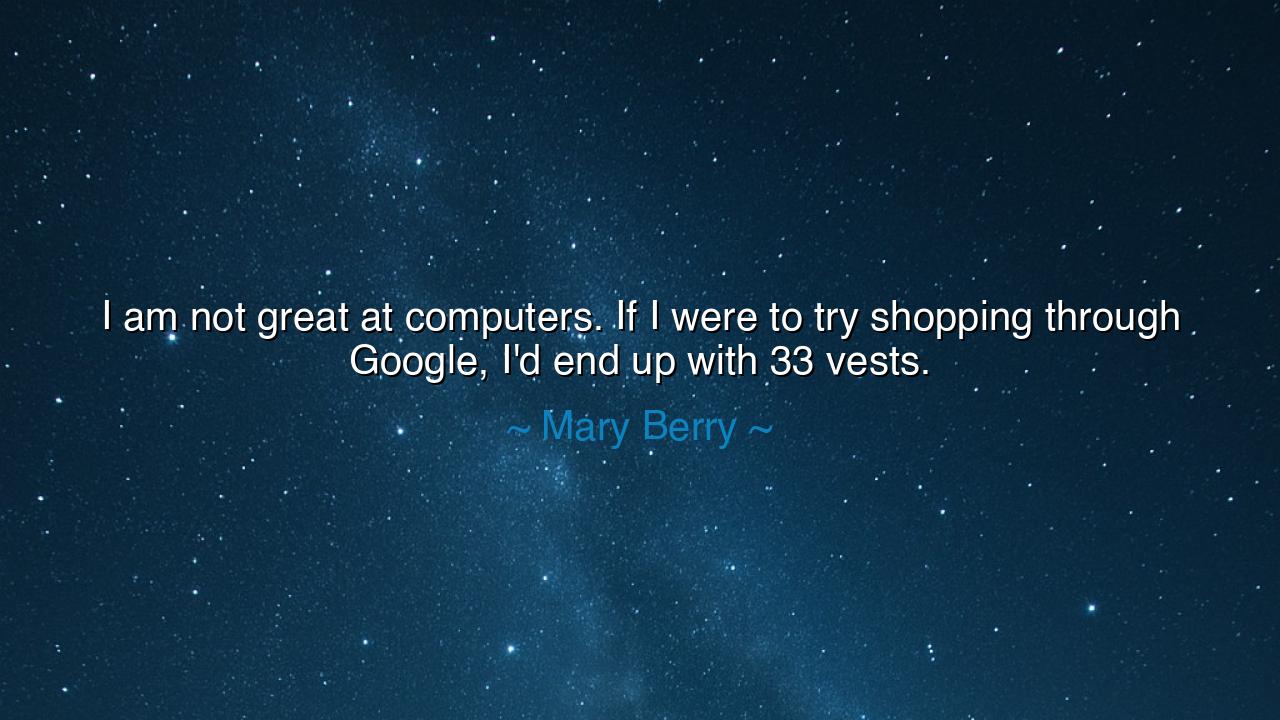
I am not great at computers. If I were to try shopping through
I am not great at computers. If I were to try shopping through Google, I'd end up with 33 vests.






"I am not great at computers. If I were to try shopping through Google, I'd end up with 33 vests." – Mary Berry
In this seemingly light-hearted reflection, Mary Berry offers a profound lesson about the nature of human vulnerability and the limits of our understanding, particularly in the face of rapidly advancing technology. Though she speaks humorously about her own struggles with computers, there is a deeper truth hidden in her words: even the most capable among us have moments when we feel overwhelmed by the tools of the modern age. In this case, the very act of shopping, a task once as simple as walking into a market, has become an intricate dance of algorithms, key terms, and digital interfaces. Berry’s quote illustrates a reality that many face today: that technology, despite its great promise, can often lead us astray, taking us down pathways that feel random or unpredictable.
Consider, in ancient times, when knowledge and tools were simpler, and the wisdom of the elders was passed down not through machines, but through oral tradition, direct experience, and personal interaction. There were no complex systems to navigate, no vast oceans of information to sift through. Yet even in those times, there were those who struggled to understand the tools of their era—whether it was the invention of the wheel, the first writing systems, or the early mathematical principles. The great philosophers of ancient Greece, such as Plato and Socrates, knew the value of self-awareness—that true wisdom comes from recognizing the limits of one's own knowledge. Berry, in her playful comment, embraces this very humility—she does not claim to know everything but acknowledges her limitations with humor and grace.
The lesson of humility is important. In an age where digital tools shape so much of our lives, it is easy to feel that we must master everything. The pressure to be adept at all things, especially technology, can lead to frustration and a sense of failure. However, Berry's words remind us that it is okay to not understand everything, especially in a world so complex and fast-moving. The simplicity that once characterized many aspects of life is now overwhelmed by the complications of modern digital systems, making even simple tasks like shopping feel like an adventure in the unknown. Her comment about buying 33 vests highlights how one small misstep can lead to unintended consequences in a world where control over digital systems often feels elusive.
Consider the tale of Leonardo da Vinci, whose genius spanned so many fields—art, science, engineering—that it might seem he was an expert in all things. Yet even Leonardo, in his notebooks, often expressed frustration with the complexities of his own designs, unsure of how to fully bring his visions to life. Despite his remarkable understanding of the world, he, too, was humbled by the limitations of his tools and his understanding of the natural world. In many ways, Leonardo’s struggles with his inventions parallel the modern struggle with technology. We may not understand everything about the tools we use, but this does not diminish our value or our ability to create. Rather, it is in embracing our imperfections that we find the space for growth, creativity, and true wisdom.
The story of Mary Berry’s 33 vests also speaks to the unpredictability of digital systems. What was once a simple task—purchasing something—now carries with it the potential for chaos. The very nature of technology has become so intricate, its systems so layered, that what might seem like an easy action can turn into a cascade of unforeseen events. This is not just a modern frustration; it speaks to the ancient human condition of trying to navigate forces beyond our control, whether those forces be nature, society, or, now, technology. In the past, humans built structures and tools that reflected their understanding of the world, yet the unexpected was always present. Today, the tools we rely on are similarly unpredictable, their complexity making it difficult to anticipate all outcomes.
From Berry’s story, we learn a simple yet profound lesson: the pursuit of mastery over everything—whether over the complexities of technology or the vastness of knowledge—is ultimately an impossible task. We must instead focus on what we can control, what we can understand, and what truly matters in our lives. Technology should serve us, not overwhelm us. The ultimate lesson, then, is one of balance—learning to embrace what we can understand and leaving room for humility and humor in the face of what remains beyond our grasp. Just as Socrates taught, the first step to wisdom is acknowledging what we do not know, and Mary Berry's words are a reminder that in a world of infinite information, it is okay to laugh at the complexity and to accept our limitations with grace.
Let us move forward with humility in this digital age, knowing that it is not our mastery over every machine that defines us, but our ability to navigate the challenges of this world with a sense of humor, grace, and balance. May we embrace the beauty of what we can learn and do, while also finding peace in the things that remain elusive. As Mary Berry reminds us, sometimes the best way to face the complexities of life is not to conquer them, but to accept them with a knowing smile and a laugh at the unexpected journey we are all on.






AAdministratorAdministrator
Welcome, honored guests. Please leave a comment, we will respond soon